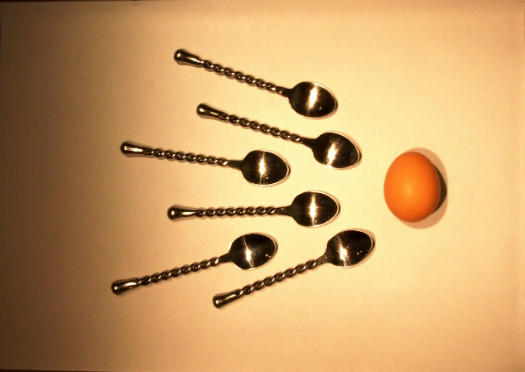

Click here to enter the gallery
Male birth control, like flying cars, just seems like one of those things we should have by now. It’s the 21st century—if they can find the Higgs Boson and bring back Arrested Development, shouldn’t they be able to come up with a birth control option for men that isn’t a condom or a vasectomy?
It’s hardly for lack of trying. There’s the classic “men have millions of sperm, but women have only one egg” argument, but that’s far from the only challenge. For a long time, it was widely assumed that men just wouldn’t be interested, though research has since proved that assumption wrong.
“I think largely, it was a generational shift, too,” says Elaine Lissner, director of the Male Contraception Information Project (MICP). “Once the Baby Boomers came into power, there was more openness to the concept, versus the generation before the Baby Boomers.”
Interest in the scientific community has grown to the point that the National Institute of Child Health and Human Development (NICHD) has hosted several conferences on developing male birth control methods. But pharmaceutical companies are the ones that will need to show interest in order for something to really get off the ground. And they’ve been largely hesitant, so far. Unlike a drug for, say, cancer, birth control ostensibly would be used by otherwise healthy men, which means there’s a much higher bar for safety.
“I see it as they’re just not willing to put their toe in the water,” says Diana Blithe, program director for the Contraceptive Development Research Centers Program and the Male Contraceptive Development Program at the NICHD. “But if there was a prototype on the market, I think others would come relatively quickly. It’s just [that] getting the first [one] all the way through the hurdles is a relatively long process. And it’s not something that they see as an immediate return on their investment. I think that it’s something that you really have to have a long vision for and companies tend not to have a very long vision… Nothing is going to get to market soon.”
But the biggest challenge is that even among those pursuing male birth control, no one can seem to agree on the best way to do it. Everyone I talk to tells me three more methods I should look into. Pills, injections, implants or procedures? Hormonal or non-hormonal? After talking to many researchers and experts in the field, I compiled eight different male contraception methods that are currently in development and outlined the cost, convenience, effectiveness, reversibility and status of each, in the gallery above.








